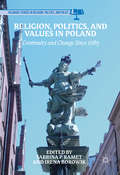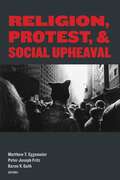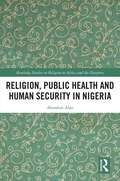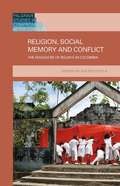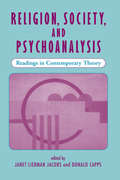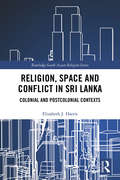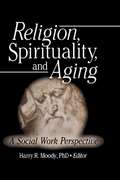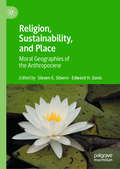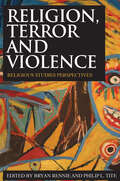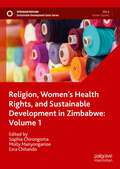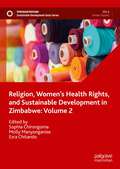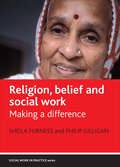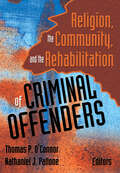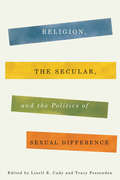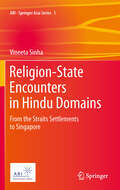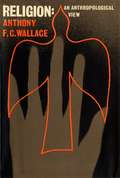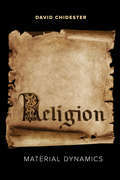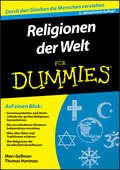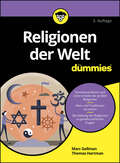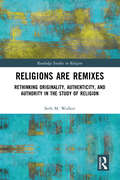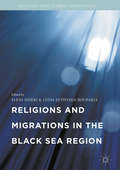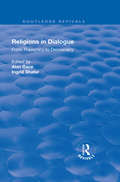- Table View
- List View
Religion, Politics, and Values in Poland: Continuity and Change Since 1989 (Palgrave Studies in Religion, Politics, and Policy)
by Sabrina P. Ramet and Irena BorowikThis volume brings together leading scholars to examine how the Church has brought its values into the political sphere and, in the process, alienated some of the younger generation. Since the disintegration of the communist one-party state at the end of the 1980s, the Catholic Church has pushed its agenda to ban abortion, introduce religious instruction in the state schools, and protect Poland from secular influences emanating from the European Union. As one of the consequences, Polish society has become polarized along religious lines, with conservative forces such as Fr. Rydzyk’s Radio Maryja seeking to counter the influence of the European Union and liberals on the left trying to protect secular values. This volume casts a wide net in topics, with chapters on Pope John Paul II, Radio Maryja, religious education, the Church’s campaign against what it calls “genderism,” and the privatization of religious belief, among other topics.
Religion, Protest, and Social Upheaval
by Matthew T. Eggemeier, Peter Joseph Fritz, and Karen V. GuthRepresents some of the best, cutting-edge thinking available on multiple forms of social upheaval and related grassroots movements.From the January 2017 Women’s March to the August 2017 events in Charlottesville and the 2020 protests for racial justice in the wake of George Floyd’s murder, social upheaval and protest have loomed large in the United States in recent years. The varied, sometimes conflicting role of religious believers, communities, and institutions in such events and movements calls for scholarly analysis. Arising from a conference held at the College of the Holy Cross in November 2017, Religion, Protest, and Social Upheaval gathers contributions from ten scholars in religious studies, theology and ethics, and gender studies—from seasoned experts to emerging voices—to illuminate this tumultuous era of history and the complex landscape of social action for economic, racial, political, and sexual and gender justice.The contributors consider the history of resistance to racial capitalist imperialism from W. E. B. Du Bois to today; the theological genealogy of the capitalist economic order, and Catholic theology’s growing concern with climate change; affect theory and the rise of white nationalism, theological aesthetics, and solidarity with migrants; differing U.S. Christian churches’ responses to the “revolutionary aesthetics” of the Black Lives Matter movement; Muslim migration and the postsecular character of Muslim labor organizing in the United States; shifts in moral reasoning and religiosity among U.S. women’s movements from the 1960s to today; and the intersection of heresy discourse and struggles for LGBTQ+ equality among Korean and Korean-American Protestants. With this pluralistic approach, Religion, Protest, and Social Upheaval offers a snapshot of scholarly religious responses to the crises and promises of the late 2010s and early 2020s. Representing the diverse coalitions of the religious left, it provides groundbreaking analysis, charts trajectories for further study and action, and offers visions for a more hopeful future.
Religion, Public Health and Human Security in Nigeria (Routledge Studies on Remote Places and Remoteness)
by Abiodun AlaoThis book critically examines the intersection of religion, public health and human security in Nigeria. Focusing on Christianity, Islam, traditional religions and "intra-religious" doctrinal divergencies, the book explores the impact faith has on health-related decisions and how this affects security in Nigeria. The book assesses the connection between religion and five contemporary major health and medical issues in the country. This includes the issue of epidemics and pandemics such as the Covid-19 pandemic, vaccines, contraception, blood transfusion and the controversies associated with "miracle healing". In particular, the book explores situations where individuals have the power of choice but instead, embraces faith and religious positions that contradict science in the management of their health and, in the process, expose themselves and others to personal health insecurity. It investigates aspects of human security including the wider international ramifications of health issues, approaches to cures and the interpretation of causes of diseases, as well as the ethno-religious connotations of such interpretations. Exploring key issues that have brought religion into the politics of health and human security in Nigeria, this book will be of interest to students and scholars in the field of African Religion, African Politics, African Studies, public health, security, and Sociology.
Religion, Race, and the Making of Confederate Kentucky, 1830-1880
by Luke E. HarlowThis book sheds new light on the role of religion in the nineteenth-century slavery debates. In it, Luke E. Harlow argues that ongoing conflict over the meaning of Christian "orthodoxy" constrained the political and cultural horizons available for defenders and opponents of American slavery. The central locus of these debates was Kentucky, a border slave state with a long-standing antislavery presence. Although white Kentuckians famously cast themselves as moderates in the period and remained with the Union during the Civil War, their religious values showed no moderation on the slavery question. When the war ultimately brought emancipation, white Kentuckians found themselves in lockstep with the rest of the Confederate South. Racist religion thus paved the way for the making of Kentucky's Confederate memory of the war, as well as a deeply entrenched white Democratic Party in the state.
Religion, Social Memory and Conflict
by Sandra Milena Rios OyolaThe field of transitional justice and reconciliation considers social memory to be an important mechanism for acknowledging the violation of victims' rights and a step toward building peace. Societies in conflict, such as Colombia, challenge our current understanding of using memory in the construction of social peace processes, which in turn question the impossibility of forgiving violence that is still to come. Drawing on original ethnographical research, Rios analyses strategies of memorialization after the massacre of Bojay#65533;, Colombia, as an arena of political contention but also of grassroots resistance to persistent and diverse forms of violence. The book focuses on the work of the local grassroots Catholic Church and of the victims' association ten years after the massacre of Bojay#65533;. It explores the role of religion in the management of victims' emotions and in supporting claims of transitional justice from a grassroots perspective in a context of thin political transition.
Religion, Society, And Psychoanalysis: Readings In Contemporary Theory
by Janet L JacobsDistinguished contributors provide an overview of three generations of psychoanalytic theory, including the work of Freud, Horney, Winnicott, and Kristeva, and discuss the evolution of psychoanalytic thought as it relates to the role that religion plays in modern culture. }Religion clearly remains a powerful social and political force in Western society. Freudian-based theory continues to inform psychoanalytic investigations into personality development, gender relations, and traumatic disorders. Using a historical framework, this collection of new essays brings together contemporary scholarship on religion and psychoanalysis. These various yet related psychoanalytic interpretations of religious symbolism and commitment offer a unique social analysis on the meaning of religion.Beginning with Freuds views on religion and mystical experience and continuing with those of Horney, Winnicott, Kristeva, Miller, and others, this volume surveys the work of three generations of psychoanalytic theorists. Special attention is given to objects relations theory and ego psychology, as well as to the recent work from the European tradition. Distinguished contributors provide a basic overview of a given theorists scholarship and discuss its place in the evolution of psychoanalytic thought as it relates to the role that religion plays in modern culture. Religion, Society, and Psychoanalysis marks a major, interdisciplinary step forward in filling the void in the social-psychology of religion. It is an extremely useful handbook for students and scholars of psychology and religion.
Religion, Space and Conflict in Sri Lanka: Colonial and Postcolonial Contexts (Routledge South Asian Religion Series)
by Elizabeth J. HarrisSpace is dynamic, political and a cause of conflict. It bears the weight of human dreams and fears. Conflict is caused not only by spatial exclusivism but also by an inclusivism that seeks harmony through subordinating the particularity of the Other to the world view of the majority. This book uses the lens of space to examine inter-religious and inter-communal conflict in colonial and post-colonial Sri Lanka, demonstrating that the colonial can shed light on the post-colonial, particularly on post-war developments, post-May 2009, when Buddhist symbolism was controversially developed in the former, largely non-Buddhist, war zones. Using the concepts of exclusivism and inclusivist subordination, the book analyses the different imaginaries or world views that were present in colonial and post-1948 Sri Lanka, with particular reference to the ethnic or religious Other, and how these were expressed in space, influenced one another and engendered conflict. The book’s use of insights from human geography, peace studies and secular iterations of the theology of religions breaks new ground, as does its narrative technique, which prioritizes voices from the nineteenth and twentieth centuries, and the author’s fieldwork and personal observation in the twenty first. Through utilizing past and contemporary reflections on lived experience, informed by diverse religious world views, the book offers new insights into Sri Lanka’s past and present. It will be of interest to an interdisciplinary audience in the fields of colonial and postcolonial studies; war and peace studies; security studies; religious studies; the study of religion; Buddhist Studies, mission studies, South Asian and Sri Lankan studies.
Religion, Spirituality, and Aging: A Social Work Perspective
by Harry R MoodyLearn how to make a more positive impact with your social work with the agedReligion is an important coping mechanism for many aging adults. Religion, Spirituality, and Aging: A Social Work Perspective presents the latest research that shows how religion and spirituality can improve quality of life for elders. Respected social work researchers and scholars provide insight and practical methods for fostering positive aging while also considering how spirituality and religion can affect practitioners themselves. The full range of advantages and ethical implications are discussed in clear detail from a social work viewpoint. Case studies plainly illustrate the positive impact that the inclusion of spirituality and religion in an aging person&’s life may have on their physical and mental welfare.Organized social work in the early twentieth century actively tried to distance itself from its roots as a form of religious charity in favor of becoming a scientific and professional endeavor. Religion, Spirituality, and Aging once again bridges the gap between social work and spiritual matters by presenting penetrating articles that discusses the issues of the aging soul while examining ways to improve care. Creative strategies are offered to contribute to the spiritual side of aging while considering every implication and ethical question. The compilation is extensively referenced and includes helpful figures and tables to clearly illustrate data and ideas.Religion, Spirituality, and Aging discusses: the latest social work trends and attitudes toward spirituality prayer, meditation, and acts of altruism as interventions an empirical study of how social workers use religion and spirituality as an intervention ethical considerations and best practices religion and spirituality during long-term care the "Postcards to God" project dreams and their relationship to the search for meaning in later life a spiritual approach to positive aging through autobiography dementia and spirituality creating new rituals for sacred aging spiritual master Henri Nouwen&’s principles of aging-and his approaches to caring for older people an interview study on elders&’ spirituality and the changes manifested in their views of religionReligion, Spirituality, and Aging is a remarkable reminder that elders are our future selves. This erudite, well-reasoned examination of aging and spirituality from a social work perspective is crucial reading for social workers, human service professionals who work with the aged, and gerontology scholars.
Religion, Sustainability, and Place: Moral Geographies of the Anthropocene
by Steven E. Silvern Edward H. DavisThis book explores how religious groups work to create sustainable relationships between people, places and environments. This interdisciplinary volume deepens our understanding of this relationship, revealing that the geographical imagination—our sense of place—is a key aspect of the sustainability ideas and practices of religious groups. The book begins with a broad examination of how place shapes faith-based ideas about sustainability, with examples drawn from indigenous Hawaiians and the sacred texts of Judaism and Islam. Empirical case studies from North America, Europe, Central Asia and Africa follow, illustrating how a local, bounded, and sacred sense of place informs religious-based efforts to protect people and natural resources from threatening economic and political forces. Other contributors demonstrate that a cosmopolitan geographical imagination, viewing place as extending from the local to the global, shapes the struggles of Christian, Jewish and interfaith groups to promote just and sustainable food systems and battle the climate crisis.
Religion, Terror and Violence: Religious Studies Perspectives
by Bryan Rennie, Philip L. TiteSeptember 11 and the subsequent War on Terror continues to cast a long shadow over the world. Religion, Terror and Violence brings together a group of distinguished scholars from a range of backgrounds and disciplines to explore the claim that acts of violence – most spectacularly the attack of September 11, 2001 and the international reaction to it – were intimately linked to cultural and social authorizing processes that could be called 'religious.' This book provides a nuanced but incisive insight into the reaction of the discipline of religious studies to the post 9/11 world.
Religion, Women’s Health Rights, and Sustainable Development in Zimbabwe: Volume 1 (Sustainable Development Goals Series)
by Ezra Chitando Sophia Chirongoma Molly ManyonganiseThis volume brings to the fore the interface of religion, women’s sexual reproductive health and rights (SRHR), and the sustainable development goals (SDGs) in Zimbabwe. It emphasizes that empowering African women is a pivotal pillar for attaining sustainable development. Contributors discuss the need for implementing structural changes as a prerequisite for social progress and development to occur in Southern Africa. They interrogate the extent to which religious beliefs and practices either promote or impede women’s SRHR. The contributors also proffer several ways in which addressing the themes of health for all and equality for all women and girls can make a meaningful contribution towards the fulfillment of the goals set for Agenda 2030.
Religion, Women’s Health Rights, and Sustainable Development in Zimbabwe: Volume 2 (Sustainable Development Goals Series)
by Ezra Chitando Sophia Chirongoma Molly ManyonganiseThis volume brings to the fore the interface of religion, women’s sexual reproductive health and rights (SRHR), and the sustainable development goals (SDGs) in Zimbabwe. It emphasizes that empowering African women is a pivotal pillar for attaining sustainable development. Contributors discuss the need for implementing structural changes as a prerequisite for social progress and development to occur in Southern Africa. They interrogate the extent to which religious beliefs and practices either promote or impede women’s SRHR. The contributors also proffer several ways in which addressing the themes of health for all and equality for all women and girls can make a meaningful contribution towards the fulfillment of the goals set for Agenda 2030.
Religion, belief and social work: Making a difference (Social Work in Practice series)
by Sheila Furness Philip GilliganThis book examines how religion and related beliefs have varied impacts on the needs and perceptions of practitioners, service users, and the support networks available to them. The authors argue that social workers need to understand these phenomena, so that they can become more confident in challenging discriminatory and oppressive practices. The centrality of religion and associated beliefs in the lives of many is emphasised, as are their potentially liberating (and potentially negative) impacts. In line with the Social Work in Practice series style, the book allows readers to explore issues in depth. It focuses on knowledge transmission, and the encouragement of critical reflection on practice. Each chapter is built around 'real-life' case scenarios using a problem-based learning approach. This book is the first to deal with social work and religion so comprehensively and will therefore be essential reading not only for social work students, but also for practitioners in a range of areas, social work academics and researchers in the UK and beyond.
Religion, the Community, and the Rehabilitation of Criminal Offenders
by Thomas P O'ConnorExplore the relationship between faith-based programs, religion, and offender rehabilitation! This book reports on current research from several disciplines to help the reader understand the nature and impact of the relationship between faith-based programs, religion, and offender rehabilitation. Religion, the Community, and the Rehabilitation of Criminal Offenders is a unique resource-there has been very little research published on this important topic. President Bush's faith-based initiative recognized that religion plays a role in the justice system and corrections that is overlooked but essential-it increases the role of community and caring in the system in a unique and important way. This pathbreaking book points the way toward a system of faith-based programs that are not only effective but also economical, as these programs are often staffed by volunteers. Religion, the Community, and the Rehabilitation of Criminal Offenders addresses important questions regarding the importance and effectiveness of faith-based rehabilitation programs, including: What is the relationship between prison religion and offender rehabilitation? What motivates inmates to become involved with religious programs and activities? What is the prison chaplain's role in rehabilitation? Are certain religious denominations more effective than others in preventing crime, delinquency, and recidivism? How does religious activity help inmates adjust to the prison environment? What do inmates have to say about the religious programs they encounter within the system? How did Islam develop within American correctional institutions and what changes has the movement gone through in recent years? Why do female African-American inmates tend to resist conversion to Islam while their male counterparts embrace the Muslim faith in increasing numbers? How can sacred texts and social theory be utilized as teaching tools and intervention strategies in the transformation processes of men incarcerated for violent crimes? (A fascinating study from the Sing-Sing prison) and more!
Religion, the Secular, and the Politics of Sexual Difference (Religion, Culture, and Public Life)
by Tracy Fessenden Linell E. CadyGlobal struggles over women's roles, rights, and dress increasingly cast the secular and the religious in tense if not violent opposition. When advocates for equality speak in terms of rights and modern progress, or reactionaries ground their authority in religious and scriptural appeals, both tend to presume women's emancipation is ineluctably tied to secularization. Religion, the Secular, and the Politics of Sexual Difference upsets this certainty by drawing on diverse voices and traditions in studies that historicize, question, and test the implicit links between secularism and expanded freedoms for women. Rather than position secularism as the answer to conflicts over gender and sexuality, this volume shows both religion and the secular collaborate in creating the conditions that generate them.
Religion-State Encounters in Hindu Domains
by Vineeta SinhaThe historical and empirical project presented here is grounded in a desire to theorize 'religion-state' relations in the multi-ethnic, multi-religious, secular city-state of Singapore. The core research problematic of this project has emerged out of the confluence of two domains, 'religion, law and bureaucracy' and 'religion and colonial encounters.' This work has two core objectives: one, to articulate the actual points of engagement between institutions of religion and the state, and two, to identify the various processes, mechanisms and strategies through which relations across these spheres are sustained. The thematic foundations of this book rest on disentangling the complex interactions between religious communities, individuals and the various manifestations of the Singapore state, relationships that are framed within a culture of bureaucracy. This is accomplished through a scrutiny of Hindu domains on the island nation-state, from her identity as part of the Straits Settlements to the present day. The empirical and analytical emphases of this book rest on the author's engagement with the realm of Hinduism as it is conceived, structured, framed and practiced within the context of a strong state in Singapore today. Ethnographically,the book focusses on Hindu temple management and the observance of Hindu festivals and processions, enacted within administrative and bureaucratic frames.
Religion: An Anthropological View
by Anthony WallaceAn anthropological view of religion by Anthony F. C. Wallace, including sections on general theories on religion, religion as therapy, and religion as a form of expression.
Religion: Material Dynamics
by David ChidesterReligion: Material Dynamics is a lively resource for thinking about religious materiality and the material study of religion. Deconstructing and reconstructing religion as material categories, social formations, and mobile circulations, the book explores the making, ordering, and circulating of religious things. The book is divided into three sections: Part One revitalizes basic categories—animism and sacred, space and time—by situating them in their material production and testing their analytical viability. Part Two examines religious formations as configurations of power that operate in material cultures and cultural economies and are most clearly shown in the power relations of colonialism and imperialism. Part Three explores the material dynamics of circulation through case studies of religious mobility, change, and diffusion as intimate as the body and as vast as the oceans. Each chapter offers insightful orientations and surprising possibilities for studying material religion. Exploring the material dynamics of religion from poetics to politics, David Chidester provides an entry into the study of material religion that will be welcomed by students and specialists in religious studies, anthropology, and history.
Religionen der Welt für Dummies (Für Dummies)
by Rabbi Marc Gellman Monsignor Thomas HartmanAuf einen Blick: Gemeinsamkeiten und Unter-schiede der großen Religionen kennenlernen Die verschiedenen Glaubensbekenntnisse verstehen Alles über Riten und Traditionen erfahren Wie Religionen die Gesellschaft beeinflussen Nun sag': Wie hast du's mit der Religion? Gemeinsamkeiten und Unterschiede der verschiedenen Glaubensgemeinschaften Protestantismus, Islam, Judentum und Buddhismus kennt jeder, aber sagen Ihnen Jainismus, Bahá'í und Shinto etwas? Marc Gellman und Thomas Hartman stellen Ihnen die großen Glaubensrichtungen und deren Ursprünge vor. Sie erfahren alles über die Unterschiede und Gemeinsamkeiten der Religionen: Wie und wo die Gläubigen beten, welche Vorstellungen sie von Gott und dem Leben nach dem Tod haben und wie sie ihre Feste feiern. So wissen Sie bald, was Zarathustra sprach, Mohammed lehrte und Jesus predigte.
Religionen der Welt für Dummies (Für Dummies)
by Rabbi Marc Gellman Monsignor Thomas HartmanDie Menschen durch ihren Glauben verstehen Über Religionen hat man sich oft schnell eine Meinung gebildet – doch wie viel wissen wir wirklich über sie? Dieses Buch stellt Ihnen verschiedene Religionen vor und zeigt Gemeinsamkeiten und Unterschiede auf. Marc Gellman und Thomas Hartman erzählen von heiligen Menschen und Schriften und erläutern die Standpunkte der Glaubensgemeinschaften zu kritischen gesellschaftlichen Fragen. Die Autoren schildern auch, wie die Menschen ihren Glauben praktizieren und welche Auswirkungen Religion auf die Gesellschaft hat. So liefert Ihnen dieses Buch einen Überblick über den Glauben von Menschen rund um die Welt. Sie erfahren Was eine Religion ausmachtWelchen ethischen Verhaltensregeln die Weltreligionen folgenWie religiöse Botschaften verbreitet werdenWelche verschiedenen Glaubensformen es neben den großen Religionen gibt
Religions Are Remixes: Rethinking Originality, Authenticity, and Authority in the Study of Religion (Routledge Studies in Religion)
by Seth M. WalkerThis book utilizes an approach that centers on remix theory and conceptual metaphor theory, arguing for an examination of the study of religion via a model for analyzing cultural constructs that the author terms Remix+/-. After discerning the metaphorical correspondences underlying his argument, the author claims that the shift in conceptual and terminological framing remix provides can assist in understanding religious phenomena and developments differently, paying close attention to the sorts of meanings, implications, and assumptions that are disrupted and subverted as a result. The chapters indicate how notions of originality, authenticity, and authority are problematized and challenged from the perspective modeled by Remix+/-, with Buddhist philosophy occupying a significant role in the demonstrative examples. This book will be of interest to remix theorists and conceptual metaphor theorists because it advances a new approach to applying both remix and metaphor to the study of cultural constructs. It will also be valuable for those studying religion and digital culture—especially Buddhist thought and practice—as it proposes a new lens through which religiosity can be defamiliarized and critically analyzed.
Religions Of Mesoamerica: Second Edition
by David CarrascoThe Second Edition of Religions of Mesoamerica comes at a turning point in the study of the Americas and the religious and cultural histories of the New World. To that end, esteemed scholar Davíd Carrasco integrates past and current research, developments, and excavations to vividly synthesize the history of Mesoamerican cultures their religious forms, ceremonial centers, complex social structures, view of time and space, myths, and rituals. Carrasco's deep yet concise overview takes readers on an absorbing journey where they experience the dynamics and complexities of Aztec and Maya cultures, the Spanish conquest, and cultural combinations of European and indigenous ideas and practices. He skillfully demonstrates how the religious imagination was and continues to be crucial to the survival and creativity of Mesoamerica and its Chicano/a descendants.
Religions and Migrations in the Black Sea Region
by Eleni Sideri Lydia Efthymia RoupakiaThis book focuses on the interconnections of religion and migration in the Black Sea region through case studies that explore shifting identities, community and national boundaries, and social practices and networks. During the past few decades the Black Sea has been transformed from a largely closed region, due to the Cold War, to a bridge for human, economic, and cultural capital flows. As the region opened up, understandings and practices of religion were re-signified due to new and diverse mobilities and resettlements. This volume addresses and responds to the current scarcity of academic research on the repercussion of political reform, migration, and modernization in the areas surrounding the Black Sea. Contributors uncover and examine the pivotal role of religion in current cultural contestations taking place in this strategic region. Engaging with a wide range of case studies, the book offers a fresh, comparative examination of migration as it relates to different countries and religious groups in the region.
Religions and Migrations in the Black Sea Region (Religion and Global Migrations)
by Eleni Sideri and Lydia Efthymia RoupakiaThis book focuses on the interconnections of religion and migration in the Black Sea region through case studies that explore shifting identities, community, and national boundaries, as well as social practices and networks. During the past few decades the Black Sea has been transformed from a largely closed region, due to the Cold War, to a bridge for human, economic, and cultural capital flows. As the region opened up, understandings and practices of religion were re-signified due to new and diverse mobilities and resettlements. This volume addresses and responds to the current scarcity of academic research on the repercussion of political reform, migration, and modernization in the areas surrounding the Black Sea. Contributors uncover and examine the pivotal role of religion in current cultural contestations taking place in this strategic region. Engaging with a wide range of case studies, the book offers a fresh, comparative examination of migration as it relates to different countries and religious groups in the region.
Religions in Dialogue: From Theocracy to Democracy (Routledge Revivals)
by Alan Race Ingrid ShaferThis title was first published in 2002. Judaism, Christianity and Islam, as Abrahamic religions, share much theological common ground and the momentum for dialogue between them at theological levels has greatly increased in recent decades. This book explores the relationship between religion and the modern democratic state from the perspective of these three monotheistic traditions. It investigates how the three religions in dialogue might overcome their historic antagonism as a prelude to working for the development of the global common good. As part of the test of religious ideals, some of the contributions bring theory down to earth by examining the role of religion in three democratic states with different histories - Turkey, Indonesia, India - and also in relation to a culture of human rights. Drawing together leading Muslim, Christian, and Jewish authors from America, Europe and Asia, the book presents a rare collaboration of faiths and ideas to make a contribution to studies of inter-religious dialogue and the changing role of religion in the democratic state.
